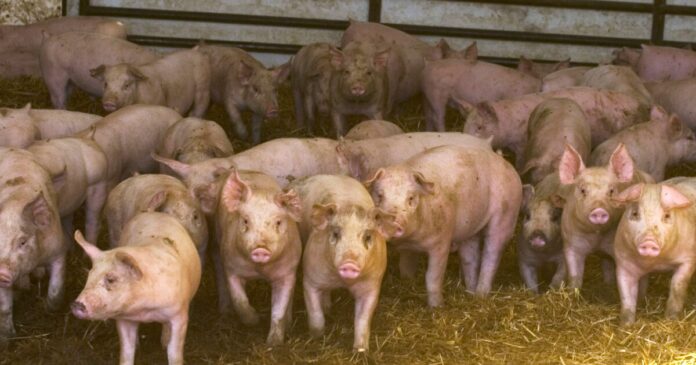The Supreme Court on Thursday upheld an animal-welfare law approved by California’s voters, ruling that the state’s restrictions on the sale of pork that is produced by the cruel confinement of breeding pigs does not violate the Constitution.
Justice Neil M. Gorsuch, writing for the court, said the Constitution leaves it to states and their voters to decided on the products that will be sold there. He said these questions should not be decided by federal judges.
“Companies that choose to sell products in various states must normally comply with the laws of those various states,” he said. “While the Constitution addresses many weighty issues, the type of pork chops California merchants may sell is not on that list.”
The ruling is a victory for animal-rights advocates as well as the rights of the states to set their own laws.
In 2018, 63% of California voters approved Proposition 12, which prohibited the sale of eggs or meat that originates from the extreme confinement of egg-laying hens, breeding pigs or calves raised for veal.
The law was due to take full effect last year, but pork producers went to court to challenge the provisions affecting their industry.
At issue was the practice of holding breeding pigs in tight metal cages where they cannot turn around or lie down, and sometimes in frustration try to chew the metal bars.
The California law required larger pens or open areas where sows could move freely.
The decision split the court along unusual lines. Joining Gorsuch were Justices Clarence Thomas, Sonia Sotomayor, Elena Kagan and Amy Coney Barrett.
Meanwhile, Chief Justice John G. Roberts Jr. and Justices Samuel A. Alito, Brett M. Kavanaugh and Ketanji Brown Jackson dissented in part. They said the California restrictions on pork sales put a substantial burden on the free flow of interstate commerce.
Gorsuch did not dispute that point, but said the Constitution says Congress shall have the power “to regulate commerce among the states.” It does not put that power entirely in the hands of judges, he said.
The court has long been skeptical of using the Constitution to strike down state laws. That authority rests in a provision that says Congress may “regulate commerce … among the several states.”
In the past the court has used the provision to strike down state laws that protect home-state businesses from competition or otherwise discriminate against the free flow of interstate commerce.
In this case, National Pork Producers vs. Ross, the pork industry noted that 99% of the pork sold in California is produced elsewhere, so the burden of its law would be largely felt by other states.
While some of the largest meat packers, including Hormel Foods and Tyson Foods, said they could comply, the National Pork Producers Council said the law would require farmers in Iowa and North Carolina to change how they raise and confine their breeding pigs.
To comply with the California law, breeding pigs would have to be given larger pens that would allow them to stand and turn around, or they could be confined in an open area with other pigs. The producers said those changes would increase their costs by 9%.
The pork producers lost before a federal judge in San Diego and at the U.S. 9th Circuit Court of Appeals, which said they had no claim of a constitutional violation. But last year, the Supreme Court agreed to hear the industry’s appeal.
The attorney for the pork producers argued that if California’s law were upheld, it would open the door for other states to seek changes that would affect the national economy.
For example, they said Oregon could require that products sold there from other states must be made by workers who were paid the state’s higher minimum wage, while Texas might require products sold there be made by only lawful U.S. residents.
The Biden administration joined the case on the side of the pork producers and stressed a similar argument. California’s Proposition 12 “imposes a substantial burden on interstate commerce,” said Deputy Solicitor Gen. Edwin Kneedler. “It invites conflict and retaliation and threatens the balkanization of the national economic union.”
California Solicitor Gen. Michael Mongan defended the law on the grounds that it applied only to pork sold in the state and not elsewhere.
“California voters chose to pay higher prices to serve their local interest in refusing to provide a market to products they viewed as morally objectionable and potentially unsafe,” he said.


